Redditor Asks If She Should Report Her Friend for Finding a Lost Dog and Gifting It to Another Person Without Trying to Find Its Owner
Finding a new home for an abandoned dog is always the right thing to do and is probably among the most generous acts in the world. But what if the dog wasn't abandoned, and yet you find it a new home?
Well, that would essentially be stealing someone else's dog. It doesn't matter if you did it with the best intentions.
The fact that someone can lose their four-legged friend because you didn't go through all the necessary steps to find the rightful owner is not generous at all. This Reddit user feels the same way about her friend.
Recently, her friend found a lost Bull Terrier. He attempted to find its owner by posting its picture on social media, but something happened, and he deleted the posts just a few hours later.
This struck the Redditor as very strange, so she asked him why he did that. His answer was also quite suspicious to the OP, especially considering that he had found a new home for the dog in just a couple of hours.
Moreover, her friend didn't even check if the dog was microchipped. Knowing how her friend tends to distort the truth, the Redditor took matters into her own hands and tried to find the dog's owner herself.
That search was short-lived, as she managed to find the owner in no time. However, she now believes that her friend literally stole someone's dog and gifted it to another person. This has caused her a dilemma: should she contact the owner behind her friend's back or try to talk to her friend? She reached out to other Redditors for help.
Take a look at the whole story below.
The Original Story:

She saw that her friend had found the dog and was trying to locate its owner, so she suggested to him what to do next:
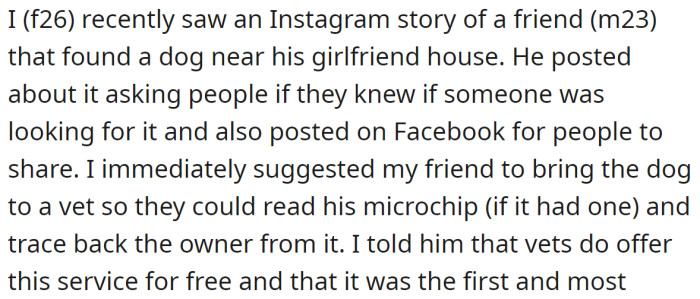
But her friend had different plans for the dog:
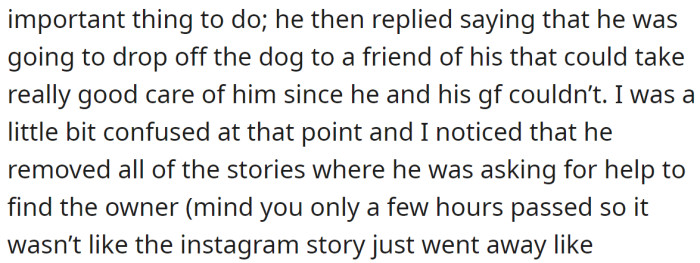
Ethical Considerations in Pet Ownership
Finding a lost dog and rehoming it without attempting to locate its owner raises significant ethical questions. Ethologists emphasize that animals have strong attachments to their owners, and separating them can lead to distress for both the pet and the owner. Research indicates that the bond between a pet and its owner is akin to the attachment bonds seen in human relationships, reinforcing the responsibility individuals have to ensure these connections remain intact. This situation highlights the importance of considering the emotional ramifications of rehoming pets without consent.
"I was a little shocked that he decided to randomly take a dog," explained the OP.
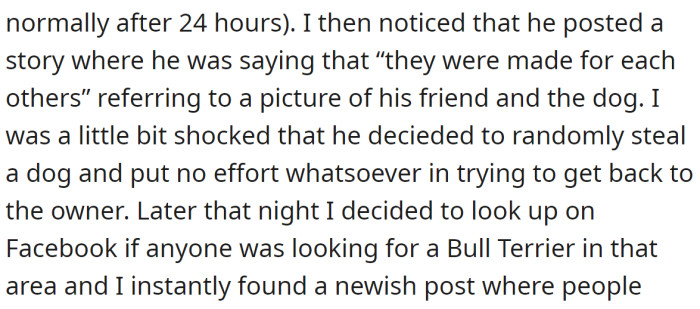
Then the OP tried to convince her friend to contact its owner, even though he had already found it a new home:
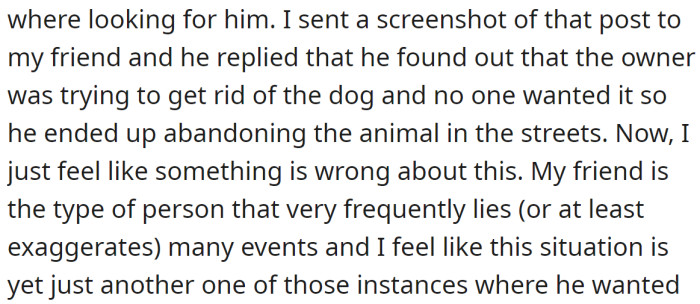
This whole story made the OP doubt her friend:
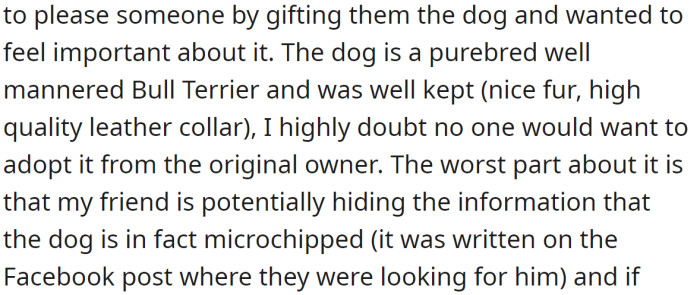
Behavioral studies indicate that individuals often act on immediate emotional responses, which can obscure ethical judgment. As noted by Dr. Daniel Goleman, an expert in emotional intelligence, "Our emotions can lead us to make hasty decisions that overlook the broader implications of our actions." Furthermore, Dr. Esther Perel, a renowned couples therapist, emphasizes the importance of considering the impact of our choices, stating, "In relationships, as in life, the consequences of our actions extend beyond our immediate feelings." It is vital for individuals to reflect on the potential repercussions of their decisions, not only for their emotional motivations but also for the well-being of the animal and its family.
So she thought maybe she should call the owner of the dog herself:
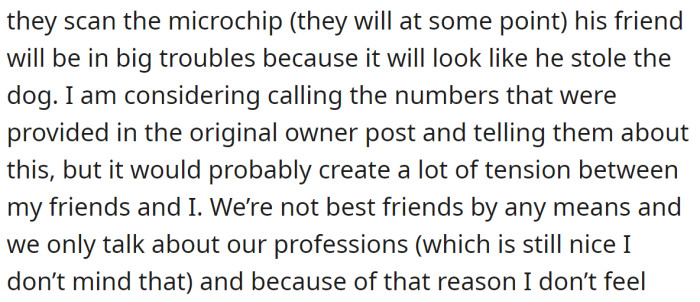
But she wasn't sure if it was the right thing to do:

"YTA if you don't speak up"
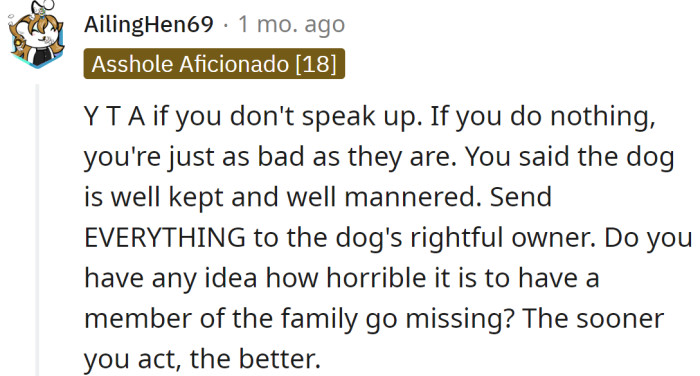
Practical Steps for Responsible Pet Rehoming
To promote ethical pet ownership, individuals should be educated about the proper steps to take when finding a lost animal. This includes checking for identification, notifying local shelters, and using social media platforms to reach out to the community. Creating a checklist for lost and found pets can help streamline this process and ensure that every effort is made to reunite pets with their owners. Additionally, community awareness campaigns can promote responsible pet ownership and foster a culture of empathy towards lost animals.
"I would be devastated if someone stole my dog"
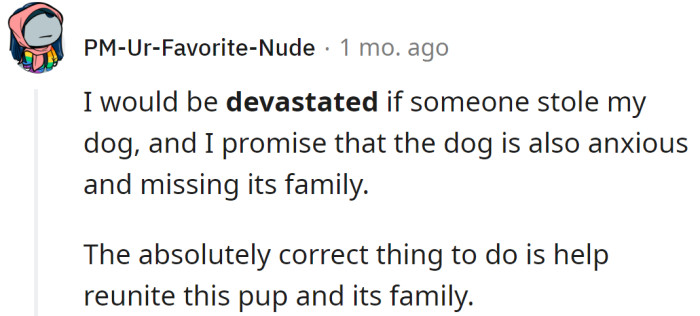
"You don’t need this person in your life"
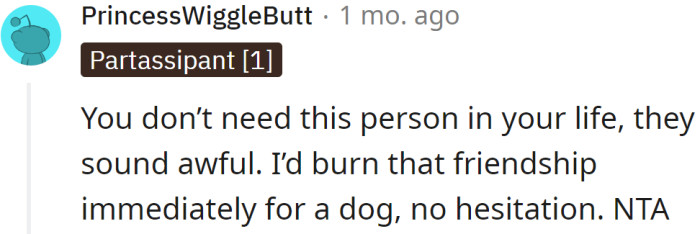
"Call the owners now"
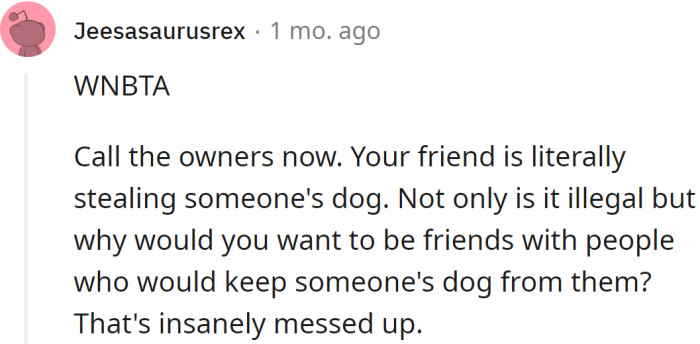
Animal welfare advocates stress the importance of compassion and responsibility in handling lost pets. By fostering a culture that values reuniting animals with their families, communities can enhance both animal welfare and social cohesion. Encouraging individuals to take the time to search for an animal's owner can lead to more positive outcomes for everyone involved. This approach not only benefits the animals but also strengthens community bonds, promoting a shared sense of responsibility.
"Your friend is lying. Report them."

"Your friend is TA here."
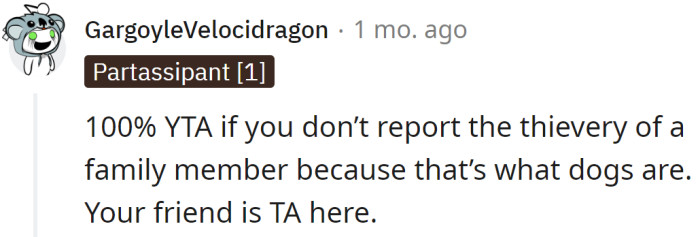
The OP updated the post with the latest information she found out, and it's quite a turnaround:
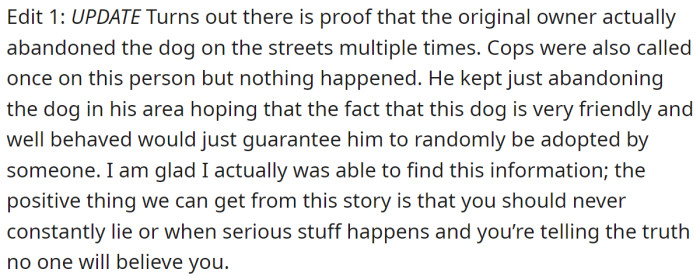
It turns out that the OP's friend was telling the truth from the beginning. But if nothing else, this story taught us that we shouldn't judge a book by its cover.
OP had her own reasons to doubt her friend's intentions, but perhaps she was wrong about him as well. Anyway, the most important thing is that the dog is well taken care of now.
Psychological Analysis
This situation underscores the ethical responsibilities that come with finding lost pets. Individuals often act based on emotion, which can cloud their judgment regarding the best course of action. Encouraging a thoughtful approach to pet rehoming can ensure that animals are treated with the care and consideration they deserve.
Analysis generated by AI
Analysis & Alternative Approaches
In conclusion, ethical considerations in pet ownership are vital to ensuring the well-being of animals and their families. Research supports the notion that impulsive decisions can have lasting consequences, highlighting the need for responsible actions when handling lost pets. By educating communities on proper protocols for rehoming and promoting empathy, we can create a more compassionate environment for all.



